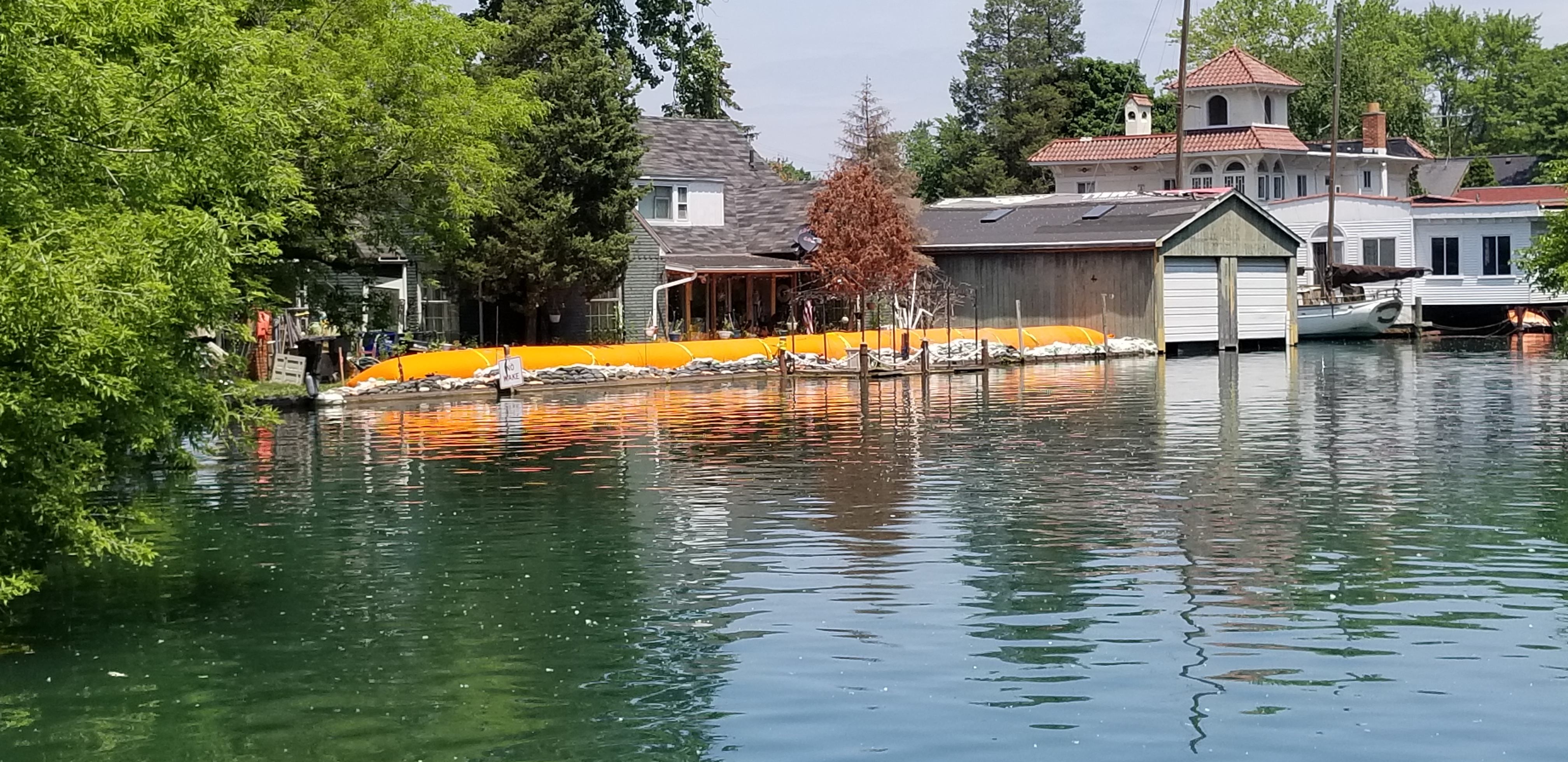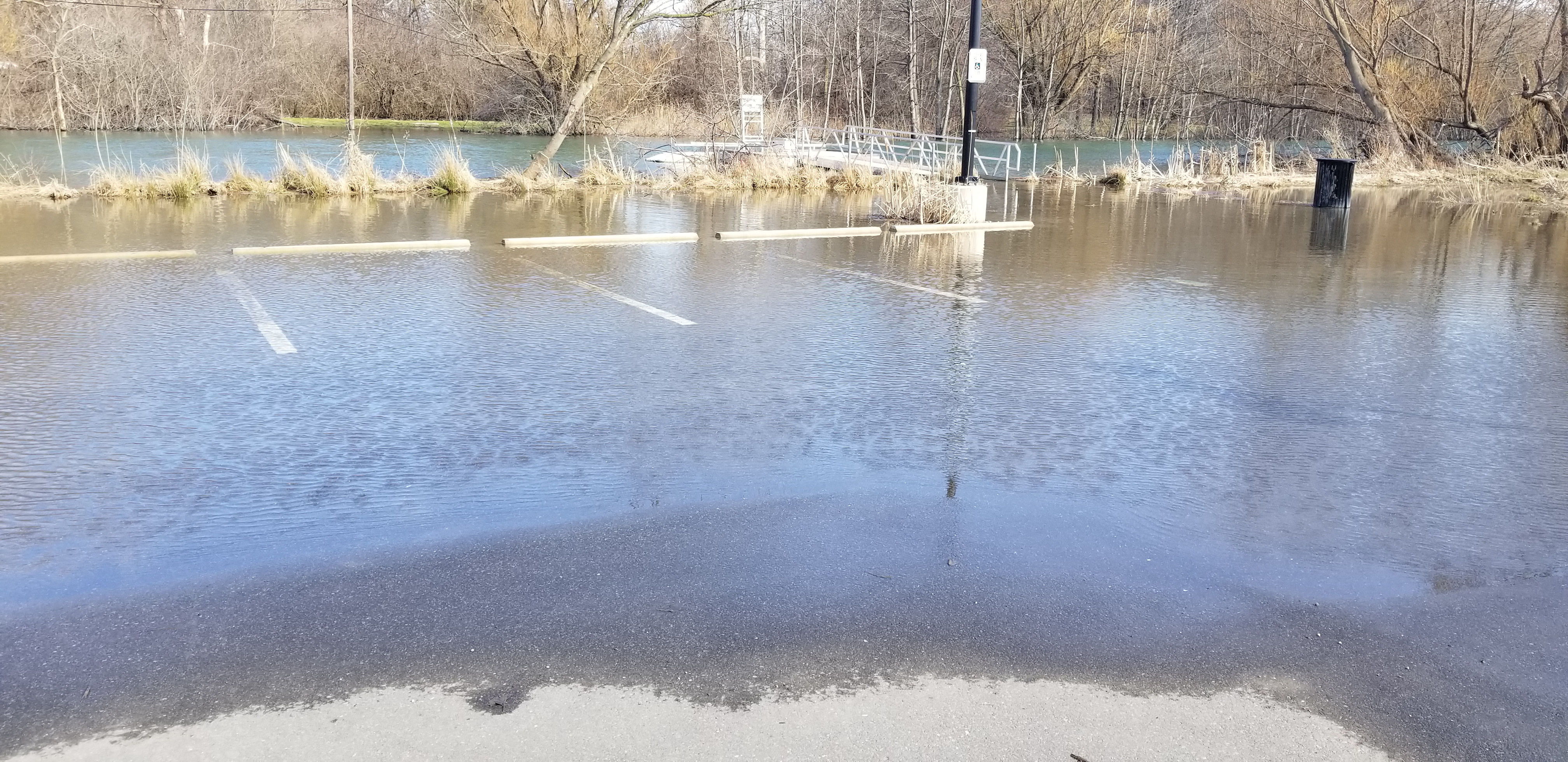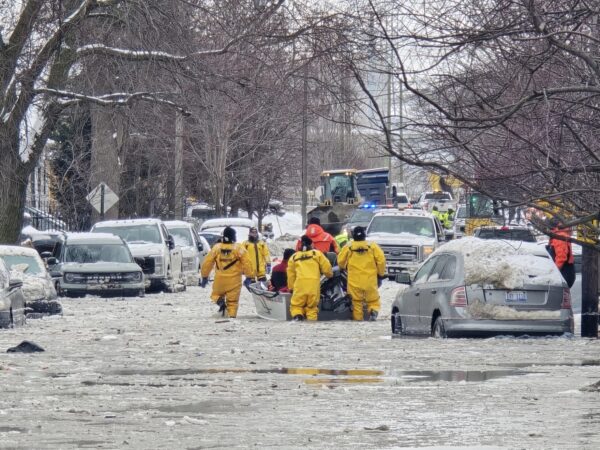
Great Lakes Moment is a monthly column written by Great Lakes Now Contributor John Hartig. Publishing the author’s views and assertions does not represent endorsement by Great Lakes Now or Detroit Public Television.
Scientists have predicted that warmer, wetter and wilder weather is coming and that this will be one of the greatest environmental challenges of the 21st Century. Lake St. Clair and Lake Erie water levels set record highs for the month of May. These high water levels are putting a human face on climate change in our region.
In Detroit’s Jefferson-Chalmers neighborhood, Tiger Dams—flexible tubes filled with water—were installed at a cost of $2 million to protect homes from flooding.
On Belle Isle, construction of the new $1.5 million Oudolf Garden had to be delayed last year because of 100-year high water levels. The solution was to redesign it to be flood proof, including moving it further away from the riverfront and raising it by 3 feet.
API key not valid. Please pass a valid API key.In 2019, the Friends of Detroit Rowing, which leases the Belle Isle Boat House, had to move 60 weddings due to high water levels. Flooding around the Belle Isle Boat House was preventing vendors from making deliveries for weddings and they even had to build a temporary elevated sidewalk like a dock to get people into the building.
At times, water has covered the Strand near the Coast Guard station, and fish have been seen swimming across the road. Completion of a $5 million Lake Okonoka habitat restoration project had to be delayed because of record-high water levels. The Michigan Department of Natural Resources, who manages Belle Isle State Park, has had to invest more than $300,000 to stave off flood damage on Belle Isle.
In Wyandotte, high Detroit River water levels in 2019 caused flooding of the parking lot of The Waterfront Restaurant and Lounge, causing temporary closures. In spring of 2019, portions of Downriver received 3.6 inches of rain in a 7-hour period, causing substantial flooding of basements in Allen Park, Lincoln Park and Ecorse, resulting in substantial damage to personal belongings. In Wayne County’s Elizabeth Park, Michigan’s oldest county park, high Detroit River water levels have flooded parking lots along the canal and restricted access to a new kayak launch.

Flooding at Wayne County’s Elizabeth Park (Photo by John Hartig)
High water levels have caused property damage and increased shoreline erosion and flooding. Scientists worry that climate change is increasingly turning extraordinary into the ordinary. These warmer, wetter and wilder climate conditions will likely also result in changes to how our ecosystems function. For example, warmer lakes, tributaries and terrestrial ecosystems, reduced ice cover, and increased runoff will alter the range and distribution of certain bird and fish species, increase the frequency and severity of harmful algal blooms in the western basin of Lake Erie, exacerbate wetland loss, create new threats from invasive species, diminish beach health, and in some cases displace or extirpate native species.
The Earth’s average surface temperature has risen about 0.9 degrees Celsius since the late 19th century, a change driven largely by increased carbon dioxide and other human-made emissions in the atmosphere. Most of the warming has occurred in the past 35 years, with the five warmest years on record taking place since 2015. Atmospheric monitoring in the Western Lake Erie Climate Division has documented a 5.6 percent increase in precipitation since 1951 and an increase in the frequency of extreme precipitation events. Scientists predict that climate change will also result in wilder weather conditions, including more intense and frequent storms that will increase flooding and runoff, alter our ecosystems, and result in substantial social and economic impacts.
API key not valid. Please pass a valid API key.Detroit’s response
In Detroit, climate change is projected to increase the intensity and frequency of storms that will test and overwhelm the city’s infrastructure and threaten the health of residents in other ways. Flooding will continue to affect Detroit homes and streets due to projected increases in intense precipitation. Detroit is also projected to see a significant increase in very hot days, with as many as 65 days above 90 degrees Fahrenheit by the end of this century, exacerbating the burden of heat and poor air quality on the city’s most vulnerable residents.
Greenhouse gas emissions are driving global climate change, and Detroit is committed to contributing its fair share to efforts led by cities around the world in mitigating the impacts of climate change. Despite the United States pulling out of the Paris Climate Accord in 2017, over 400 U.S. mayors, representing 70 million Americans, have signed on, including Detroit Mayor Mike Duggan, to fight climate change and lower greenhouse gas emissions.
In 2017, Detroiters Working for Environmental Justice worked with many community, governmental, business and academic partners to develop the Detroit Climate Change Action Plan. In 2019, Detroit released its Detroit Sustainability Action Agenda, addressing climate change and other sustainability issues. On July 24, 2019, Detroit City Council unanimously passed an ordinance to greatly and swiftly reduce greenhouse gas emissions from the city. The ordinance stipulates that greenhouse gas emissions from city sources will be reduced from baseline conditions by 35 percent by 2024, 75 percent by 2043 and 100 percent by 2050. It will also work towards reducing citywide emissions by 30 percent by 2025. These carbon emission reduction targets established in the ordinance are based on the standards of the Paris Climate Agreement, which looks to prevent global temperatures from rising more than 2 degrees Celsius by the end of the century.
Windsor’s response
The city of Windsor committed to be a leader of climate change adaptation and mitigation through its daily actions and services. This is shown through the development of its Climate Change Adaptation Plan. In fact, Windsor was one of the first municipalities in Ontario and Canada to undertake adaptation planning. In November 2019, the city of Windsor declared a climate change emergency, acknowledging the dramatic impacts already happening and worsening in the future if things aren’t improved.
In addition to adapting to the changing climate, the city of Windsor developed a Community Energy Plan with ambitious targets to support the global effort to keep global temperature increases within 1.5 degrees Celsius. Through the implementation of this plan, the Windsor community will reduce per capita energy use and per capita CO2 emissions by 40 percent between 2014 and 2041.
Do our part
Solving climate change will take a global effort, but we all must do our part. Things that we can do include:
- support the implementation of the Detroit Sustainability Action Agenda and the Detroit Climate Action Plan, and Windsor’s Climate Change Adaptation Plan and Community Energy Plan;
- practice energy conservation in our homes and businesses;
- perform an energy audit of our home or place of work;
- walk, cycle, carpool or take a bus instead of driving;
- consider an electric vehicle or plug-in hybrid;
- promote and use renewable energy; and
- remind our elected officials that we must care for the place we call home and ensure that it is a gift to our children and grandchildren.
Keep up with more Great Lakes Moments at Great Lakes Now:
Roller Coaster: Michigan’s long history with environmental contamination
Great Lakes Moment: Investing in pollution prevention and restoration pays off
Great Lakes Moment: River otters return to western Lake Erie
Great Lakes Now Contributor John Hartig is a board member at the Detroit Riverfront Conservancy. He serves as the Great Lakes Science-Policy Advisor for the International Association for Great Lakes Research and has written numerous books and publications on the environment and the Great Lakes. Hartig also helped create the Detroit River International Refuge, where he worked as the refuge manager until his retirement.
Featured image: Tiger Dam in Jefferson-Chalmers neighborhood (Photo by John Hartig)




